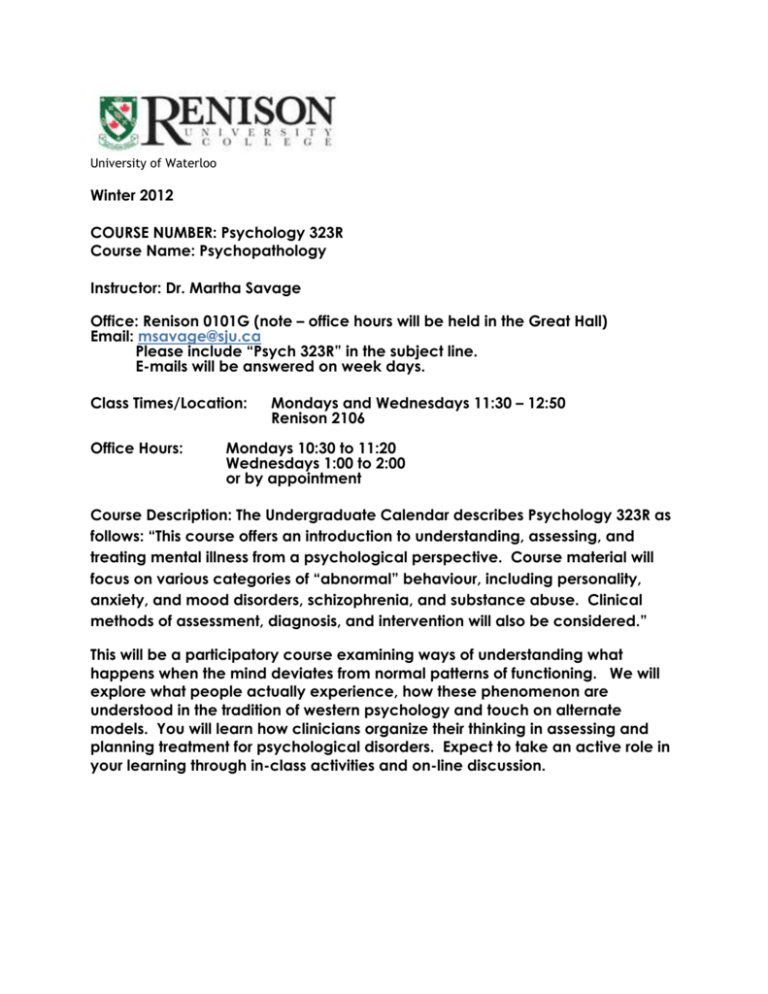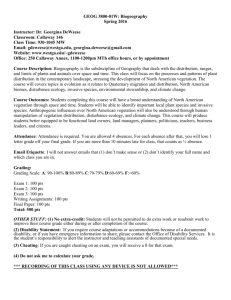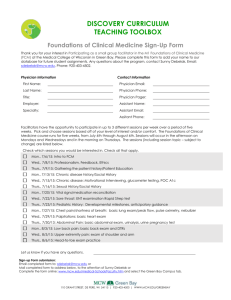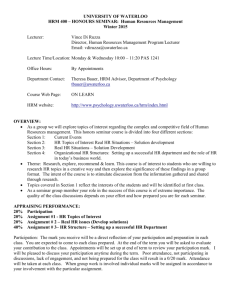psych 323r - University of Waterloo
advertisement

University of Waterloo Winter 2012 COURSE NUMBER: Psychology 323R Course Name: Psychopathology Instructor: Dr. Martha Savage Office: Renison 0101G (note – office hours will be held in the Great Hall) Email: msavage@sju.ca Please include “Psych 323R” in the subject line. E-mails will be answered on week days. Class Times/Location: Office Hours: Mondays and Wednesdays 11:30 – 12:50 Renison 2106 Mondays 10:30 to 11:20 Wednesdays 1:00 to 2:00 or by appointment Course Description: The Undergraduate Calendar describes Psychology 323R as follows: “This course offers an introduction to understanding, assessing, and treating mental illness from a psychological perspective. Course material will focus on various categories of “abnormal” behaviour, including personality, anxiety, and mood disorders, schizophrenia, and substance abuse. Clinical methods of assessment, diagnosis, and intervention will also be considered.” This will be a participatory course examining ways of understanding what happens when the mind deviates from normal patterns of functioning. We will explore what people actually experience, how these phenomenon are understood in the tradition of western psychology and touch on alternate models. You will learn how clinicians organize their thinking in assessing and planning treatment for psychological disorders. Expect to take an active role in your learning through in-class activities and on-line discussion. Course Objectives: At the conclusion of this course you will be able to: 1. Systematically describe a broad range of psychological disorders including contributing factors, how people are affected, and typical treatment approaches 2. Demonstrate the use of basic versions of commonly used clinical tools including clinical history format, mental status exam format, multiperspective formulation and some cognitive-behavioural therapy techniques 3. Discuss the limitations and biases in the models used in this area 4. Evaluate media coverage of mental health issues. Text: Sue, D., Sue, D., & Sue, S. (2011). Understanding Abnormal Behaviour, tenth edition. USA: Wadsworth. ISBN 1111834598 Course Requirements: Lectures – The most consistant advice students in my previous courses have offerred to future students is to plan to attend every lecture and I agree. Note that lectures go considerably beyond the scope of the readings, so just knowing the textbook will not be sufficient to do well in this course. Classes will include other learning activities as well as lecture, so come prepared to get involved. Readings – An outline of required readings from the text as well as optional supplimental resources will be provided on the first day of class and posted on the course web-site. On-Line Discussion Groups – Students will participate in three on-line discussion groups, each lasting about three weeks. The assigned groups of about eight people will explore the themes of the mental health system, mental health in the media, and cross-cultural models of psychopathology. While these activities are group oriented, students will be graded on their individual contributions by the instructor. Mini-Assignments – Five brief assignments, designed to take one to two hours to complete, will reinforce study skills and encourage students to think more deeply about the material coverred in classes. Exams – The mid-term test will cover all course material to that date. The final exam will be cumulative. Both exams will feature a mixture of multiple choice questions and short-answer questions. Expect to see the clinical tools taught in class on the exams. Grading: Discussion Groups (3 x 10%) Mini-assignments (5 x 2%) Mid-term Exam Final Exam 30% 10% 20% 40% Syllabus: Date 2012 Wed. Jan 4 Mon. Jan 9 Wed. Jan 11 Mon. Jan 16 Wed. Jan 18 Mon. Jan23 Wed. Jan 25 Mon. Jan 30 Wed. Feb 1 Mon. Feb 6 Wed. Feb 8 Mon. Feb 13 Wed. Feb 15 Mon. Feb 27 Wed. Feb 29 Mon. Mar 5 Lecture Theme Course Intro and Tools of the Trade Models and Diagnostic Systems and Phenomenology of Mood Disturbance Hows and Whys of Mood Disturbance Treatment of Mood Disorders Introduction to Cognitive Behavioural Therapy Phenomenology of Psychosis Hows and Whys of Psychosis Treatment of Psychosis Phenomenology of Anxiety Hows and Whys of Anxiety Treatment of Anxiety Mid-Term Test Critical Appraisal of Media Coverage Personality Part 1 Personality Part 2 Suicide and Self-Harm Behaviour Wed. Mar 7 Mon. Mar 12 Wed. Mar 14 Mon. Mar 19 Wed. Mar 21 Mon. Mar 26 Wed. Mar 28 Mon. April 2 Eating Disorders Part 1 Eating Disorders Part 2 Mind-Body Disturbance - Dissociation Mind-Body Disturbance - Somatization Sexual Disorders Addiction Social Factors Review Academic Integrity: In order to maintain a culture of academic integrity, members of the University of Waterloo community are expected to promote honesty, trust, fairness, respect and responsibility. Academic Integrity website (Arts): http://arts.uwaterloo.ca/arts/ugrad/academic_responsibility.html Academic Integrity Office (UW): http://uwaterloo.ca/academicintegrity/ Discipline: A student is expected to know what constitutes academic integrity [check www.uwaterloo.ca/academicintegrity/ ] to avoid committing academic offences and to take responsibility for his/her actions. A student who is unsure whether an action constitutes an offence, or who needs help in learning how to avoid offences (e.g., plagiarism, cheating) or about “rules” for group work/collaboration, should seek guidance from the course instructor, academic advisor, or Renison’s Administrative Dean. When misconduct has been found to have occurred, disciplinary penalties will be imposed under Policy 71, Student Discipline. For information on categories of offences and types of penalties, students should refer to this policy www.adm.uwaterloo.ca/infosec/Policies/policy71.htm . For typical penalties check Guidelines for the Assessment of Penalties, www.adm.uwaterloo.ca/infosec/guidelines/penaltyguidelines.htm. Grievance: A student who believes that a decision affecting some aspect of his/her university life has been unfair or unreasonable may have grounds for initiating a grievance. Read Policy 70, Student Petitions and Grievances, Section 4, www.adm.uwaterloo.ca/infosec/Policies/policy70.htm Appeals: A student may appeal the finding and/or penalty in a decision made under Policy 70 - Student Petitions and Grievances (other than regarding a petition) or Policy 71 - Student Discipline if grounds for an appeal can be established. Read Policy 72 - Student Appeals www.adm.uwaterloo.ca/infosec/Policies/policy72.htm. Note for students with disabilities: The Office for Persons with Disabilities (OPD), located in Needles Hall, Room 1132, collaborates with all academic departments to arrange appropriate accommodations for students with disabilities without compromising the academic integrity of the curriculum. If you require academic accommodations to lessen the impact of your disability, please register with the OPD at the beginning of each academic term. Final Examination Policy For Winter 2012, the established examination period is April 9 -21, 2012. The schedule will be available in February. Students should be aware that student travel plans are not acceptable grounds for granting an alternative final examination time (see http://www.registrar.uwaterloo.ca/exams/finalexams.html).








